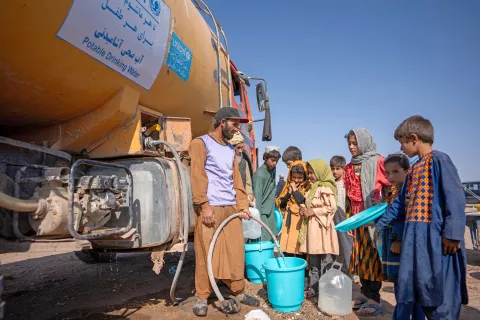Less time collecting water, more time with the family
A new UNICEF-supported solar system brings water to Kamina’s doorstep

KABUL, AFGHANISTAN – Imagine you are forced to flee from home, running from violence erupting around you. You just want a better life for your children. You walk over 100 kilometres, finally reaching shelter.
But there is no water. Your children cannot wash their hands after using the toilet or before eating. They fall sick. You must walk over 30 minutes to reach the nearest water source, making multiple trips to home and back with the heavy, 20-liter plastic receptacle full of water. When COVID-19 sweeps through your small community, you cannot access enough water to maintain personal hygiene, and your whole family suffers from the disease.
For Kamina, she did not have to imagine. This was her reality.
Originally from Kapisa Province in northeastern Afghanistan, in 2016 she settled with other displaced persons in Kabul’s Qala-e Abdul Ali community with her four children, later giving birth to a fifth child.

“When we first arrived in the settlement, there were just four communal toilets and two bathing rooms for 380 people,” Kamina recalled.
“There was a water pump, but it was poorly constructed, and it required daily maintenance. It broke after only one month.”
Kamina was forced to fetch water from private homes outside her settlement, petrol stations, or nearby masjids.
In early 2022, UNICEF intervened. While beginning construction on a new water supply system inside the settlement, UNICEF distributed hygiene kits to every family. Each kit included soap for laundry and handwashing, shampoo, towels, toothbrushes and toothpaste, and sanitary pads for women.

UNICEF also supports hygiene promotion sessions for residents of Abdul Ali.
“I began attending educational sessions with other women, and I learned how to wash hands properly and keep our home environment clean. I also learned so much about menstrual hygiene, like how to use disposable sanitary pads and how to properly clean the cloth pads.”

The new solar-powered water pump was completed in February 2022. The pump draws water from a 120-metre chlorinated borehole, storing the clean, safe drinking water in a 10,000-litre reservoir tank. The water is piped to four taps positioned just outside family homes in the settlement.
24 hours a day, residents of Abdul Ali settlement can now access clean, safe water for drinking, bathing, cooking, handwashing, and keeping their homes clean.

"Since there is water right outside our home, my children are healthier. My home is cleaner. Even our food seems to taste a little better.
My children used to help me collect water during the day, but now they can use their time to play with their friends.
When schools reopen, they will be able to attend full time instead of collecting water with me for part of the day."

UNICEF also installed 30 new toilets and 30 new bathing rooms, which are now shared by two families rather than 12.
“We used to defecate in the open,” says Kamina. “There were not enough toilets for everyone, and many of the women did not feel comfortable sharing with so many people. I am really dedicated to keeping my new toilet clean.”

The new water system is maintained by the community. UNICEF supported training sessions for a 10-person water committee, responsible for the operation and maintenance of the system infrastructure.
“I even learned a little about maintenance of the water system,” says Kamina.
“I am happy that we have such easy access to water now, so I can spend less time walking to fetch water and more time with my children.”




